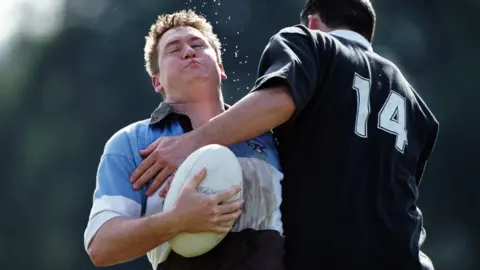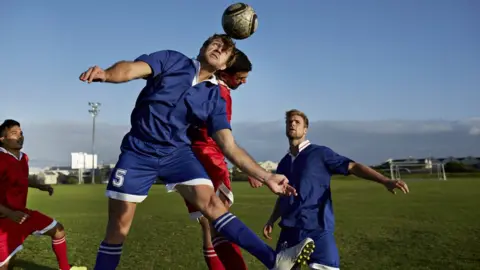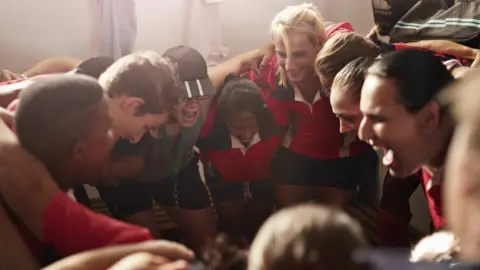Sport is 'marking its own homework' on athletes' brain injuries, say MPs
 Getty Images
Getty ImagesSport has been allowed to "mark its own homework" on reducing the risks of brain injury, an MPs' inquiry says.
Its report calls for a standard definition of concussion that all sports must use, and a paid medical officer at every major sporting event.
It comes as the first study to scan elite rugby players' brains suggests one in four could be at risk of small abnormalities.
But the long-term effects on brain health are not clear, researchers say.
And they stress that there are many health benefits to taking part in sport, which must also be taken into account.
The inquiry, carried out by the Digital, Culture, Media and Sport select committee of MPs, heard evidence from former athletes, scientists, doctors, players' unions and the governing bodies for various sports.
'Dereliction of duty'
It found "unaccountable" governing bodies had failed to address the issue of brain injury in their sports, and said the government had "failed to take action on player welfare".
As a result, its report said, the safety of athletes could be easily lost when funding for individual sports depended on how good their protocols looked on paper, but not in practice.
"We've been shocked by evidence from athletes who suffered head trauma, putting their future health on the line in the interests of achieving sporting success for the UK," committee chairman Julian Knight said.
 Getty Images
Getty Images"The Health and Safety Executive is responsible by law. However, risk management appears to have been delegated to the national governing bodies, such as the FA (Football Association).
"That is a dereliction of duty which must change," said Mr Knight.
He added that at grassroots level, the committee had found "negligible effort to track brain injuries" and the long-term impacts of them.
Scientific evidence
There is mounting evidence that heading a football repeatedly over many years may cause brain damage.
And previous research has found that former professional footballers are three-and-a-half times more likely to die of dementia than people of the same age in the general population.
But there is still no definitive proof that one causes the other.
The issue hit the headlines after former England player Jeff Astle died aged 59 of dementia nearly 20 years ago, and a coroner ruled that he had the brain of a boxer which had been damaged by years of heading heavy leather footballs.
During the inquiry, his daughter Dawn Astle told MPs that she felt let down by the lack of research that had taken place since.
"I want to make sure that the game is safe, safe for players now, players in the future, and children coming into the game. Sport just has not done enough and they should hang their heads in shame, in my opinion," she said.
Rugby brain study
In rugby, the potential for players to have mild brain injuries from heavy contact is much greater - particularly in rucks and tackles.
In a study of 44 elite rugby players from seven clubs, funded by the Drake Foundation, brain scans showed rugby players were more likely to have suffered changes to their brains than other athletes in non-contact sports, and non-athletes.
In fact, 10 of the players had signs of damage on scans, including small tears in blood vessels - and these were seen in players with and without a recent head injury.
In half of the players, scans showed unexpected changes in the brain's shape (or white matter volume).
 Getty Images
Getty ImagesThere was no evidence that any of these players had poorer cognitive function or memory than other people in the study.
Prof David Sharp, senior study author from Imperial College London, said: "What is not clear at this stage is the long-term clinical impact of these changes.
"Further research is needed to understand the long-term implications of repeated head injuries experienced during a rugby career and to provide more accurate ways to assess risk for an individual."
Dr Richard Sylvester, consultant neurologist at the National Hospital of Neurology and Neurosurgery and Homerton University Hospital, said: "You can find an abnormality if you look hard enough - but what is the relevance of it?"
The Rugby Football Union (RFU) has announced a series of measures to reduce head impacts by players in training and matches.
It says it will agree a new framework for contact training, and introduce off-field assessments of head impacts in the women's game - this already exists in men's rugby.
